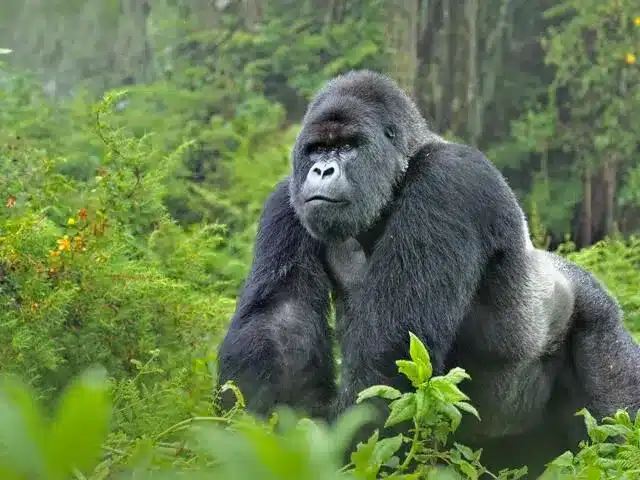About Gorillas:
- Gorillas are the largest of the great apes (there are 5 species of great apes, including, gorilla, orangutan, chimpanzee, bonobo, and human).
- Gorillas share 98.3% of their genetic code with humans, making them our closest cousins after chimpanzees and bonobos.
- Gorillas and humans shared a common ancestor about 10 million years ago.
- There are two gorilla species in the world: the eastern gorilla and the western gorilla. The mountain gorilla is a subspecies of the eastern gorilla.
- Distribution:
- Gorillas live only in tropical forests of equatorial Africa.
- Eastern gorillas live in the Democratic Republic of the Congo (DRC), Uganda, and Rwanda.
- Western gorillas, meanwhile, can be found in Nigeria, Cameroon, the Central African Republic, Equatorial Guinea, Gabon, the Republic of Congo, Angola, and the DRC.
- Features:
- They are large powerful animals with strong prominent chests, and shoulders.
- Males are about twice as heavy as females and may attain a height of about 1.7 metres and weight (in the wild) of 135–220 kg.
- They have large, human-like hands with muscular arms that are longer than their legs.
- They have dark skin and black to brown-grey hair.
- Males acquire silver-gray saddles across their backs and upper thighs at sexual maturity, earning them the name silverback.
- The face has large nostrils, small ears, and prominent brow ridges.
- They live in family groups of usually five to ten. The groups are polygamous, with one adult silverback gorilla, leading the troop and mating with the female members.
- They are active during the day (diurnal) and primarily terrestrial, usually walking about on all four limbs with part of its weight supported on the knuckles of its hands. This mode of locomotion, called knuckle walking, is shared with chimpanzees.
- Their diet is vegetarian.
- Conservation Status:
- IUCN Red List: Both the eastern gorilla and the western gorilla are classified as ‘Critically Endangered’ under the IUCN Red List.
Q1: What are chimpanzees?
Chimpanzees are great apes found across central and West Africa. Along with bonobos, they are our closest living relatives, sharing 98.7 percent of our genetic blueprint. Humans and chimps are also thought to share a common ancestor who lived some seven to 13 million years ago.
Source: How Gorillas And Traditional Healers May Inspire Breakthroughs in Medicine
Last updated on February, 2026
→ UPSC Notification 2026 is now out on the official website at upsconline.nic.in.
→ UPSC IFoS Notification 2026 is now out on the official website at upsconline.nic.in.
→ UPSC Calendar 2026 has been released.
→ UPSC Final Result 2025 is expected to be released in the first week of March 2026.
→ Check out the latest UPSC Syllabus 2026 here.
→ Join Vajiram & Ravi’s Interview Guidance Programme for expert help to crack your final UPSC stage.
→ UPSC Mains Result 2025 is now out.
→ UPSC Prelims 2026 will be conducted on 24th May, 2026 & UPSC Mains 2026 will be conducted on 21st August 2026.
→ The UPSC Selection Process is of 3 stages-Prelims, Mains and Interview.
→ Prepare effectively with Vajiram & Ravi’s UPSC Prelims Test Series 2026 featuring full-length mock tests, detailed solutions, and performance analysis.
→ Enroll in Vajiram & Ravi’s UPSC Mains Test Series 2026 for structured answer writing practice, expert evaluation, and exam-oriented feedback.
→ Join Vajiram & Ravi’s Best UPSC Mentorship Program for personalized guidance, strategy planning, and one-to-one support from experienced mentors.
→ Check UPSC Marksheet 2024 Here.
→ UPSC Toppers List 2024 is released now. Shakti Dubey is UPSC AIR 1 2024 Topper.
→ Also check Best UPSC Coaching in India


















